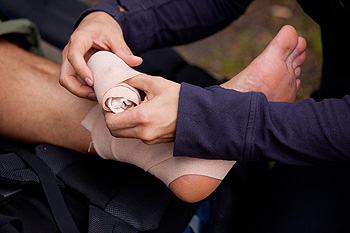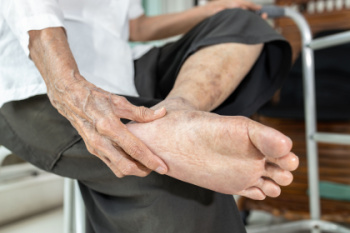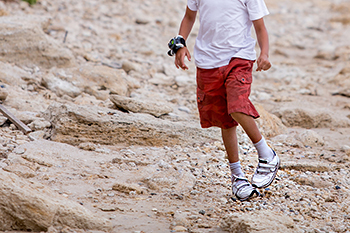Dallas (214) 340-8885
Athens (903) 677-9090
Gun Barrel City (903) 887-4341
Dallas (214) 340-8885
Athens (903) 677-9090
Gun Barrel City (903) 887-4341

Foot and ankle injuries are common during workouts, especially in high-impact activities like running, jumping, and weightlifting. Common injuries include sprains, strains, stress fractures, and Achilles tendonitis. These occur due to improper form, overuse, or inadequate footwear. Ankle sprains, for example, happen when the ligaments are stretched beyond their limit, while stress fractures develop from repetitive stress on bones. Treatment depends on the severity of the injury. Minor injuries can be managed with rest. Severe cases may require immobilization or targeted stretching exercises. Preventing these injuries involves warming up properly, wearing supportive shoes, and focusing on strength and balance training. Strengthening foot and ankle muscles and using proper form during exercises can reduce injury risks. Listen to your body and avoid pushing through pain to stay safe during workouts. If you have sustained a foot or ankle injury during your workout, it is suggested that you schedule an appointment with a podiatrist for a proper diagnosis and treatment.
Ankle and foot injuries are common among athletes and in many sports. They can be caused by several problems and may be potentially serious. If you are feeling pain or think you were injured in a sporting event or when exercising, consult with Dr. Jonathan Kletz from Texas Foot Works. Our doctor will assess your condition and provide you with quality foot and ankle treatment.
Common Injuries
The most common injuries that occur in sporting activities include:
Symptoms
Symptoms vary depending upon the injury and in some cases, there may be no symptoms at all. However, in most cases, some form of symptom is experienced. Pain, aching, burning, bruising, tenderness, tightness or stiffness, sensation loss, difficulty moving, and swelling are the most common symptoms.
Treatment
Just as symptoms vary depending upon the injury, so do treatment options. A common treatment method is known as the RICE method. This method involves rest, applying ice, compression and elevating the afflicted foot or ankle. If the injury appears to be more serious, surgery might be required, such as arthroscopic or reconstructive surgery. Lastly, rehabilitation or therapy might be needed to gain full functionality in the afflicted area. Any discomfort experienced by an athlete must be evaluated by a licensed, reputable medical professional.
If you have any questions, please feel free to contact one of our our offices located in Dallas, Athens, and Gun Barrel City, TX . We offer the newest diagnostic and treatment technologies for all your foot care needs.

Lateral ankle injuries involve damage to the ligaments on the outer side of the ankle. They are often caused by rolling or twisting the foot during activities like running, jumping, or walking on uneven surfaces. Such ankle injuries are common in athletes but can happen to anyone, especially during sudden movements or improper foot placement. The most frequent type of lateral ankle injury is an ankle sprain, where the ligaments stretch or tear. Symptoms include pain, swelling, bruising, and difficulty bearing weight on the injured foot. Diagnosis typically involves a physical exam and imaging tests, such as X-rays or MRI scans to rule out fractures and assess ligament damage. Treatment depends on the severity of the injury. Severe sprains may require bracing or targeted exercises to restore strength and mobility. If you have pain on the outside of your ankle, it is suggested that you visit a podiatrist for a diagnosis and proper care so as to prevent long-term ankle instability.
Ankle pain can be caused by a number of problems and may be potentially serious. If you have ankle pain, consult with Dr. Jonathan Kletz from Texas Foot Works. Our doctor will assess your condition and provide you with quality foot and ankle treatment.
Ankle pain is any condition that causes pain in the ankle. Due to the fact that the ankle consists of tendons, muscles, bones, and ligaments, ankle pain can come from a number of different conditions.
Causes
The most common causes of ankle pain include:
Symptoms
Symptoms of ankle injury vary based upon the condition. Pain may include general pain and discomfort, swelling, aching, redness, bruising, burning or stabbing sensations, and/or loss of sensation.
Diagnosis
Due to the wide variety of potential causes of ankle pain, podiatrists will utilize a number of different methods to properly diagnose ankle pain. This can include asking for personal and family medical histories and of any recent injuries. Further diagnosis may include sensation tests, a physical examination, and potentially x-rays or other imaging tests.
Treatment
Just as the range of causes varies widely, so do treatments. Some more common treatments are rest, ice packs, keeping pressure off the foot, orthotics and braces, medication for inflammation and pain, and surgery.
If you have any questions, please feel free to contact one of our our offices located in Dallas, Athens, and Gun Barrel City, TX . We offer the newest diagnostic and treatment technologies for all your foot care needs.

Achilles tendon tears occur when the tendon connecting the calf muscles to the heel bone is overstretched or ruptured, often during activities that involve sudden movements or intense stress, such as jumping or sprinting. Common causes include sports injuries, falls, or sudden increases in physical activity without proper conditioning. Risk factors include aging, tight calf muscles, and certain medications that weaken the tendon. Symptoms of an Achilles tendon tear include a sharp pain in the back of the ankle, swelling, difficulty walking, and an inability to push off the foot or stand on tiptoes. Some may hear a pop sound at the moment of injury. Diagnosis is typically made through physical examination, where a gap in the tendon may be felt, along with imaging tests like ultrasounds or MRI scans. Treatment options range from rest and immobilization in mild cases to surgery for more severe tears. If you have injured your Achilles tendon, it is suggested that you schedule an appointment with a podiatrist for a proper diagnosis and treatment.
Achilles tendon injuries need immediate attention to avoid future complications. If you have any concerns, contact Dr. Jonathan Kletz of Texas Foot Works. Our doctor can provide the care you need to keep you pain-free and on your feet.
What Is the Achilles Tendon?
The Achilles tendon is a tendon that connects the lower leg muscles and calf to the heel of the foot. It is the strongest tendon in the human body and is essential for making movement possible. Because this tendon is such an integral part of the body, any injuries to it can create immense difficulties and should immediately be presented to a doctor.
What Are the Symptoms of an Achilles Tendon Injury?
There are various types of injuries that can affect the Achilles tendon. The two most common injuries are Achilles tendinitis and ruptures of the tendon.
Achilles Tendinitis Symptoms
Rupture Symptoms
Treatment and Prevention
Achilles tendon injuries are diagnosed by a thorough physical evaluation, which can include an MRI. Treatment involves rest, physical therapy, and in some cases, surgery. However, various preventative measures can be taken to avoid these injuries, such as:
If you have any questions please feel free to contact one of our our offices located in Dallas, Athens, and Gun Barrel City, TX . We offer the newest diagnostic tools and technology to treat your foot and ankle needs.

Few things are as frustrating as foot pain. After all, our feet are the unsung heroes that carry us through each day, so it is difficult when they are not performing at their peak. The American Podiatric Medical Association reports that a whopping 77% of US adults have had foot problems. So, you are not alone. Suddenly, something as simple as going for a walk can turn into an uphill battle. Take plantar fasciitis, for example. This pesky condition inflames the tissue along the bottom of your foot, making those first steps in the morning feel like a walk on hot coals. Or consider bunions, those bony bumps that form at the base of your big toe, often turning your favorite shoes into a form of torture. If foot pain is throwing you off, it is suggested you schedule an appointment to see a podiatrist. They will help diagnose your condition and offer appropriate treatment solutions to get you back on your feet.
Foot Pain
Foot pain can be extremely painful and debilitating. If you have a foot pain, consult with Dr. Jonathan Kletz from Texas Foot Works. Our doctor will assess your condition and provide you with quality foot and ankle treatment.
Causes
Foot pain is a very broad condition that could be caused by one or more ailments. The most common include:
Diagnosis
To figure out the cause of foot pain, podiatrists utilize several different methods. This can range from simple visual inspections and sensation tests to X-rays and MRI scans. Prior medical history, family medical history, and any recent physical traumatic events will all be taken into consideration for a proper diagnosis.
Treatment
Treatment depends upon the cause of the foot pain. Whether it is resting, staying off the foot, or having surgery; podiatrists have a number of treatment options available for foot pain.
If you have any questions, please feel free to contact one of our our offices located in Dallas, Athens, and Gun Barrel City, TX . We offer the newest diagnostic and treatment technologies for all your foot care needs.

Congenital foot problems are deformities present from birth, affecting the structure and function of the feet. Metatarsus adductus causes the toes and the front of the foot to curve inward toward the other foot. It can be flexible, often correcting itself by six to 12 months of age, although surgery may be needed if it does not improve. Clubfoot, similar in appearance but with toes pointing downward and the bottom of the foot facing inward, is usually detected via prenatal ultrasound and treated with casting or surgery. Calcanevalgus involves a dislocation of the talus bone, causing the top of the foot to touch the shin. This condition often improves on its own but may require intervention if it persists. Congenital vertical talus causes the foot to bend upwards and outwards. Treatment typically involves casting and, in some cases, surgery. If you notice any signs of these conditions on your baby, it is suggested you promptly schedule an appointment with a podiatrist for a proper diagnosis and treatment.
Congenital foot problems require immediate attention to avoid future complications. If you have any concerns, contact Dr. Jonathan Kletz of Texas Foot Works. Our doctor can provide the care you need to keep you pain-free and on your feet.
Congenital foot problems are deformities affecting the feet, toes, and/or ankles that children are born with. Some of these conditions have a genetic cause while others just happen. Some specific foot ailments that children may be born with include clubfeet, polydactyly/macrodactyly, and cleft foot. There are several other foot anomalies that can occur congenitally. What all of these conditions have in common is that a child may experience difficulty walking or performing everyday activities, as well as trouble finding footwear that fits their foot deformity. Some of these conditions are more serious than others. Consulting with a podiatrist as early as possible will help in properly diagnosing a child’s foot condition while getting the necessary treatment underway.
What are Causes of Congenital Foot Problem?
A congenital foot problem is one that happens to a child at birth. These conditions can be caused by a genetic predisposition, developmental or positional abnormalities during gestation, or with no known cause.
What are Symptoms of Congenital Foot Problems?
Symptoms vary by the congenital condition. Symptoms may consist of the following:
Treatment and Prevention
While there is nothing one can do to prevent congenital foot problems, raising awareness and receiving neonatal screenings are important. Early detection by taking your child to a podiatrist leads to the best outcome possible.
If you have any questions please feel free to contact one of our our offices located in Dallas, Athens, and Gun Barrel City, TX . We offer the newest diagnostic tools and technology to treat your foot and ankle needs.